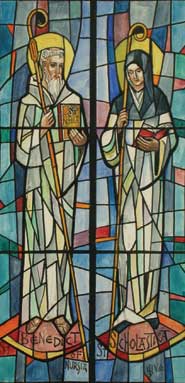Article #18
“Let them prefer nothing whatever to Christ.” Benedict of Nursia (<em>ca.</em> 480–<em>ca.</em> 550 ), in his Benedictine Rule.

Benedict and his Sister Scholastica from a print by J & R Lamb Studio
Prefer nothing whatever to Christ
The year is about 530. Christendom is in disarray. Barbarians are ravaging Europe, and the city and church of Rome are corrupt. Benedict, who leads a community of monks, is fifty years old. Thirty years earlier, while still a young man in the midst of his education at Rome, he became so horrified by the wickedness around him that he fled society to live apart, taking only a beloved nurse with him. Soon he even stole away from her and lived alone in a cave for several years. Eventually, he gained such a reputation for holiness and miracles that disciples gathered to him.
Although he has never been ordained, he has guided these followers spiritually with a firmness they could not find anywhere else at the time. He is now about to establish communities of monks in other areas. He knows he will not live much longer and, at any rate, cannot oversee places that are physically separated from him. How can he help his monks to maintain the pattern of life that will serve them best? The answer to his question almost shouts itself at him: he must prepare a rule for them, just as other famous monastic leaders did for their followers—Basil the Great in the mideast, Augustine in North Africa, and John Cassian at the abbey of St. Victor in France.
He studies those earlier rules and borrows freely from them and from the anonymous Regula Magistri (Rule of the Master). The result is seventy-two short chapters, explaining the monastic life and the behavior expected of monks and abbots.
In his fifty years, Benedict has learned a good deal about human nature and the wiles of Satan. Attempts have been made on his life and on his virtue, but he has survived them all. Perhaps what has wounded him most has been the disobedience of the monks under him. Not surprisingly, his rule insists on absolute obedience.
As he completes his guidelines, he reflects on the ideal character of a monk. He concludes they must be ardent in their love for one another and for Christ. And so he pens chapter seventy-two: “Of the Virtuous Zeal Which the Monks Ought to Have.”
“As there is a harsh and evil zeal which separates from God and leads to hell, so there is a virtuous zeal which separates from vice and leads to God and life everlasting.
“Let the monks, therefore, practice this zeal with most ardent love; namely, that in honor they forerun one another. Let them bear their infirmities, whether of body or mind, with the utmost patience; let them vie with one another in obedience. Let no one follow what he thinks useful to himself, but rather to another. Let them practice fraternal charity with a chaste love.
“Let them fear God and love their abbot with sincere and humble affection; let them prefer nothing whatever to Christ, and may he lead us all together to life everlasting.”
—Dan Graves
Dig a Little Deeper
- Pope St. Gregory the Great. Dialogues, Book 2. Life and Miracles of St. Benedict; translated by Odo J. Zimmermann, O.S.B and Benedict R. Avery, O.S.B. Collegeville, Minnesota: St. John’s Abbey, The Liturgical Press, 1949.
- “Rule of Benedict.” The Oxford Dictionary of the Christian Church. Edited by F. L. Cross and E. A. Livingstone. Oxford, 1997.
- Tompkins, Stephen. “Module 201: Benedict.”.
Next articles
Article #19: Precursor of Antichrist
Gregory the Great (ca. 540–604), in his official correspondence.
Article #20: In him are two natural wills
Sixth Ecumenical Council (681), in its Definition of Faith.
Article #21: I believe in God the Father
Pirmin (flourished eighth century), in the Writings of Abbot Pirminius.
Article #22: To come at length to yourself
The Venerable Bede (ca. 672–735), in Ecclesiastical History of the English People.



